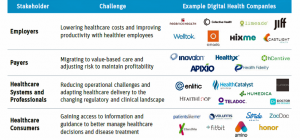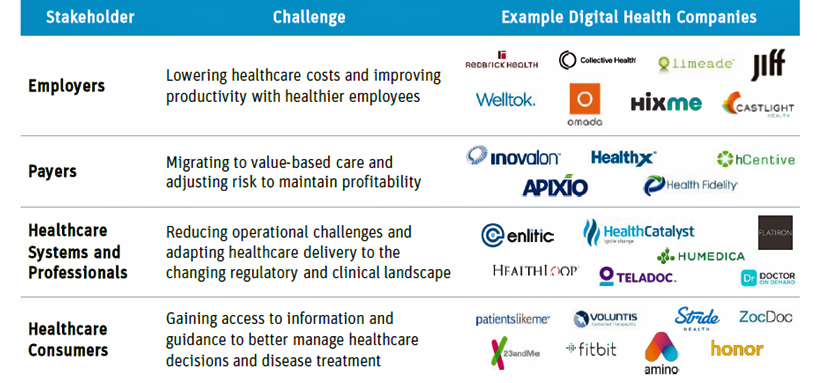
Who better than a financial services institution based in Silicon Valley to assess the state of digital health? Few organizations are better situated, geographically and sector-wise, than SVB Analytics, a division of Silicon Valley Bank based in, yes, Silicon Valley (Santa Clara, to pinpoint).
The group’s report, Digital Health: Opportunities for Advancing Healthcare, provides an up-to-date landscape on the convergence of healthcare and technology.
SVB Analytics defines digital health as “solutions that use digital technology to improve patients’ health outcomes and/or reduce the cost of healthcare.” The report provides context for the digital health market in terms of health care costs, the role of employers and payers, clinicians’ concerns, and the growing importance of patients-as-consumers.
For employers, lowering healthcare costs and bolstering workers’ productivity and wellness are top-of-mind. Examples of companies involved in that objective include Accolade (discussed here in Health Populi), Castlight Health, Jiff, Omada Health, Redbrick Health, and Welltok, among many others.
For payers, migrating to value-based care and managing risk is job one, with Apixio, Health Fidelity, and Inovalon in the mix of companies addressing this end-game.
For healthcare systems and clinicians, maintaining business objectives while adapting to the new value-based payment environment (that is, doing more with less reimbursement) is The critical success factor. Companies working in this space include telehealth firms such as American Well, Doctor on Demand, and Teladoc, among many other telemedicine providers; Flatiron Health, HealthCatalyst, and HealthLoop, and others.
When it comes to Healthcare Consumers, engaging with digital tools, data and wearable tech can help people manage wellness, illness, and healthcare costs; support healthcare “shopping;” mitigate health illiteracy; and enable self-care. Some of the growing number of firms serving health consumers are 23andMe on the genetics front; Fitbit, Garmin, and Withings for wearables and health tracking; ZocDoc for streamlining healthcare provider search, appointment-making and payment; and Honor, a new-new home care company.
Many other organizations are highlighted in the report.
Health Populi’s Hot Points: Increasingly, “digital health” will mainstream into, simply, “health” and “healthcare.” For now, in the flurry of start-ups and VC and other funding sources, two key stakeholder groups are dealing on a day-to-day basis with uncertainty of payment, processes, and privacy: health consumers and clinical professionals.
Clinicians are downhearted and at a breaking point in terms of both finance and fiscal health, and spirit. Consumers are challenged with financial un-wellness, and faced with a labyrinthine, un-transparent healthcare system when diagnosed. Those companies who address these challenges with the fundamentals of user-centered design for healthcare professionals and patients will survive in this chaotic (some would say Hyped, as in the Gartner Hype Cycle) phase of digital health chaos.





 I'm in amazing company here with other #digitalhealth innovators, thinkers and doers. Thank you to Cristian Cortez Fernandez and Zallud for this recognition; I'm grateful.
I'm in amazing company here with other #digitalhealth innovators, thinkers and doers. Thank you to Cristian Cortez Fernandez and Zallud for this recognition; I'm grateful. Jane was named as a member of the AHIP 2024 Advisory Board, joining some valued colleagues to prepare for the challenges and opportunities facing health plans, systems, and other industry stakeholders.
Jane was named as a member of the AHIP 2024 Advisory Board, joining some valued colleagues to prepare for the challenges and opportunities facing health plans, systems, and other industry stakeholders.  Join Jane at AHIP's annual meeting in Las Vegas: I'll be speaking, moderating a panel, and providing thought leadership on health consumers and bolstering equity, empowerment, and self-care.
Join Jane at AHIP's annual meeting in Las Vegas: I'll be speaking, moderating a panel, and providing thought leadership on health consumers and bolstering equity, empowerment, and self-care.